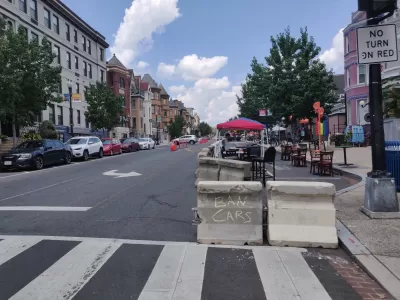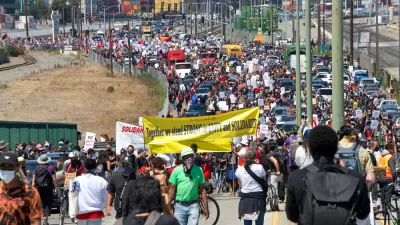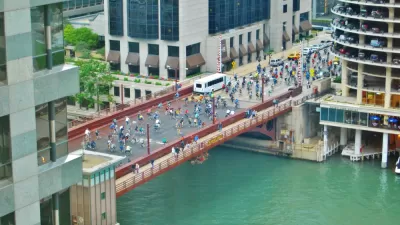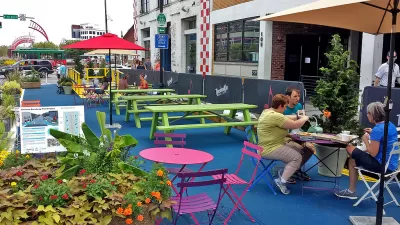Slow streets programs provided a quick short-term solution and paved the way for some permanent street closures and realignments. Now, these programs are getting a second look as community groups react to the changes.

In a piece for Bloomberg CityLab, Laura Bliss assesses the explosive growth of Slow Streets in 2020 and the impacts of the quick rollout of street closure programs on communities of color.
When Oakland implemented a Slow Streets program in April, many planners and residents lauded its quick rollout and positive effects on walking and biking safety. But a survey showed that "while affluent, white and non-disabled residents were overwhelmingly proponents of the program, people of color, people with lower incomes, and people with disabilities reported much lower levels of awareness, use and support." Some residents felt confused and taken by surprise, claiming the city didn't engage in thorough outreach to the residents on the affected streets. Others pointed to the deaths of Black men and women in the public right-of-way at the hands of police as a reminder that safety on public streets often looks different for people of color.
Bliss writes that "the anger was palpable in long follow-up meetings spent with community groups." If the solution is unclear, the disconnect is obvious. "At this point..... #OaklandSlowStreets need to come to an end," tweeted an East Oakland bike nonprofit in May. Warren Logan, the director of mobility policy and interagency relations in the Oakland mayor’s office, pointed to that tweet, among similar messages, as an example of the gulf between city planners and the community. "If he’s upset about what I thought was a bike-friendly program, then we’re obviously missing something."
Following the backlash, the city worked with community groups to revise the Slow Streets program, adding more public input on street selection, updating street closure signage and developing clearer messaging. "Critics give the city credit for persistence," writes Bliss, but think the city has done little so far to make real change. Slow streets programs in other cities faced similar resistance. In Seattle, residents of historically Black neighborhoods said the program signage made them feel excluded and "triggered at least one uncomfortable confrontation."
"In a year that has put police departments in the spotlight for their legacies of brutalizing Black communities, there has also been a quieter reckoning over the fact that those who configure streets, build highways and fund housing can have an equally profound impact on communities of color — often negative." Planners have to balance the urge to seize the opportunities presented by the pandemic and implement projects quickly with the profession's "history of trauma" and the critical need for establishing trust and true dialogue with the communities affected by their decision-making.
FULL STORY: ‘Slow Streets’ Disrupted City Planning. What Comes Next?

Planetizen Federal Action Tracker
A weekly monitor of how Trump’s orders and actions are impacting planners and planning in America.

Maui's Vacation Rental Debate Turns Ugly
Verbal attacks, misinformation campaigns and fistfights plague a high-stakes debate to convert thousands of vacation rentals into long-term housing.

Cuomo Is the Candidate of Both NIMBYs and Developers. What Gives?
In the New York City mayoral race, odd bedfellows align to preserve the housing status quo.

San Antonio and Austin are Fusing Into one Massive Megaregion
The region spanning the two central Texas cities is growing fast, posing challenges for local infrastructure and water supplies.

Charlottesville Temporarily Has No Zoning Code
A judge ordered the Virginia city to throw out its newly revised zoning code, leaving permitting for new development in legal limbo.

In California Battle of Housing vs. Environment, Housing Just Won
A new state law significantly limits the power of CEQA, an environmental review law that served as a powerful tool for blocking new development.
Urban Design for Planners 1: Software Tools
This six-course series explores essential urban design concepts using open source software and equips planners with the tools they need to participate fully in the urban design process.
Planning for Universal Design
Learn the tools for implementing Universal Design in planning regulations.
Heyer Gruel & Associates PA
JM Goldson LLC
Custer County Colorado
City of Camden Redevelopment Agency
City of Astoria
Transportation Research & Education Center (TREC) at Portland State University
Jefferson Parish Government
Camden Redevelopment Agency
City of Claremont





























